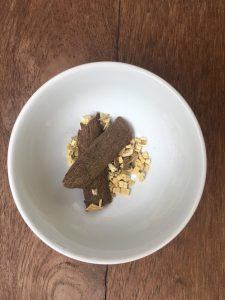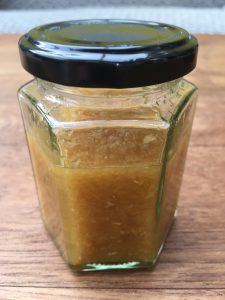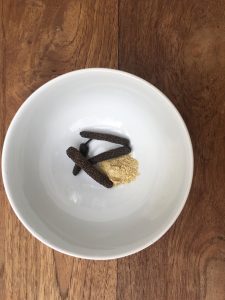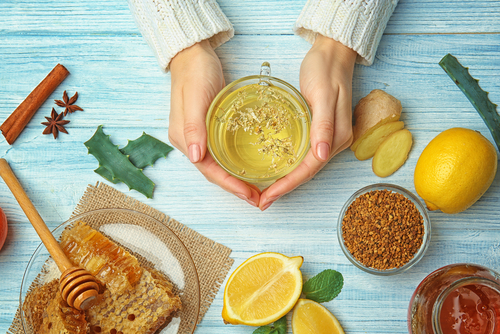We often suffer from coughs and colds throughout Autumn, Winter and Spring. Symptoms can vary, but nasal congestion, chesty coughs, headaches, body aches and sometimes fever are all too familiar at this time of year.
From an Ayurvedic perspective, Autumn and Winter is Vata and Kapha season respectively. Autumn, being cold, windy and dry can lead to an accumulation of these qualities within us; especially if you are a Vata type person. Ayurvedic principles state that ‘like increases like’, therefore Vata types may experience dry irritable coughs, dry skin and also dryness in the digestive system and colon.
When Vata types are exposed to excessive dry, cold conditions it can affect their delicate digestive system causing impaired agni (digestive fire). Undigested foods leads to the accumulation of ama (toxins) and ultimately the conditions previously mentioned.
The same can be said about the winter months and Kapha types. Winter brings a cold, moist environment; just the conditions which are most likely to increase Kapha within Kapha dominant individuals. The qualities of Kapha are cold, heavy, slow and sticky, which are just like the qualities of mucus or phlegm which tends to accumulate in Kapha types.
A Kapha dominant site in the body is the chest. This is where excess Kapha accumulates leading to chesty coughs and a potential for infection if the mucus stagnates in the chest.
The key to staying well throughout the Autumn and Winter months is prevention. The first step in prevention is to ensure the digestive fire is efficiently metabolising and digesting the foods we eat. Maintaining a healthy digestive fire will prevent the build up of ama (toxins) in the body.
Undigested food, or ama is the root cause of most coughs, colds and congestion. For Vata types, repeated exposure to cold, windy conditions, eating cold, rough (raw) or dry foods can result in impaired digestion leading to body aches and chills, colds and dry irritable coughs . Demulcent herbs alleviate dryness and irritation.
Prevention for Vata types
- Stay warm
- Enjoy moist, nourishing foods and warm drinks. Soups, stews, warming grains and vegetables cooked with ghee and warming spices are easily digested.
- Avoid dry, cold foods and cold drinks.
- Include warm, moistening, expectorant foods, herbs and spices in your diet.Flaxseeds soak them first in warm water and add them to warm ‘grain’ porridge for breakfast. Avoid oats which can be excessively drying. Alternative grains are rice, quinoa, amaranth or buckwheat.
- Warming spices for Vata: ginger, cinnamon, cloves, nutmeg, cardamon, long pepper, rock salt, caraway, bay leaf, turmeric, thyme, star anise, sage are all fantastic.
Liquorice is also an effective sweet,warming expectorant, which will help pacify Vata. Try a cup of sweet, soothing liquorice root and cinnamon bark tea. Dry ginger is

Liquorice and cinnamon bark
a heating expectorant, but the addition of liquorice with its moistening qualities will not aggravate Vata. Add both ingredients to a pan of boiling water and simmer for 5 mins.
Kapha types generally suffer from productive, chesty coughs and colds with clear, abundant phlegm. Yellow, phlegm, fever and inflammation of the mucus membrane usually indicates the involvement of Pitta.
Again, the key to staying well for Kapha types is prevention. Eating Kapha foods: dairy products, wheat; oily, heavy foods, sugar and refined carbohydrates will ultimately affect the ‘slow’ digestion for Kapha types.
Prevention for Kapha types
- Stay warm
- Avoid the above mentioned foods
- Avoid cold foods and drinks
- The diet should be light, warming and nourishing. Small meal only when you feel hungry. Avoid snacking between meals and avoid overeating.
- Include warming expectorants herbs and spices in cooking and in the form of warming teas: dry ginger, cloves, cinnamon, cardamon, mustard seeds, orange peel, pippali, sage. Warm, nourishing foods and drinks.
- Stay active. Daily brisk walking is essential. Don’t be tempted to stay in bed late or sleep throughout the day as the can increase Kapha.
Ayurvedic Cold Remedies
Ginger is a fantastic ingredient to use when cooking, and in warming teas. It is suitable for all doshic types. Fresh ginger can be taken by Vata, Pitta or Kapha types and dry ginger, which has warming qualities, is more suitable for Vata and Kaha types.
Honey is also an effective expectorant, which has heating qualities. When using honey, don’t cook with it or add it to boiling water as it will lose its wonderfully healing properties.
Ginger, lime juice, Jaggery (or unrefined brown sugar) and honey

Ginger, lime juice and jaggery
Combine equal quantities of freshly grated ginger, lime juice and unrefined jagger (or unrefined brown sugar).
I have used 100g of each, which can be kept in an airtight jar for a few days. Add 3 tsp to boiling water and let it cool slightly. Add honey and enjoy this deliciously warming cold remedy. Drink 3 times per day.
Ginger, cinnamon and cardamon tea.
- Dry ginger 2 parts
- Ground cinnamon 3 parts
- Cardamon – a pinch of ground seeds.
- 1tsp honey
Allow the dry ingredients to infuse in a cup of boiling water for about 10 mins. Add honey when cooled a little and enjoy. This remedy is more suitable for Vata and Kapha types. The heating qualities of the dry ginger may aggravate Pitta.
Long pepper and ginger

Pippali – Indonesian long pepper and ground ginger
Both ingredients have warming expectorant qualities and especially suitable for Kapha types. Try adding ground ginger and ground pippali when cooking or allow both ingredients to infuse in boiling water to make an expectorant tea. Add honey to taste.
Daily routine and other remedies
If you are suffering from a cold or flu, rest is essential to allow the body to heal. To relieve nasal congestion and irritation, a few drops of ghee can be inserted into nostrils morning and evening. Alternate Nostril breathing: Nadi Shodana is an effective practice to relieve congestion. Light exercise is beneficial – a few gentle rounds of Surya Namaskar will warm the body and encourage mucus to drain from the nose.


We sampled the ginger, lime, jaggery and honey drink and the liquorice and cinnamon one at the yoga class this morning. Both were delicious, warming and certainly cleared the airways, thank you Clare. There was the added benefit of having the wonderful subtle taste of liquorice with me for sometime afterwards.